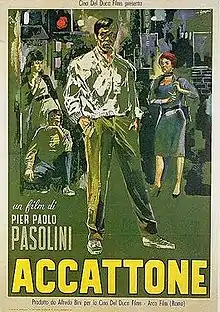Accattone
Accattone is a 1961 Italian drama film written and directed by Pier Paolo Pasolini. Despite being filmed from an original screenplay, Accattone is often perceived as a cinematic rendition of Pasolini's earlier novels, particularly The Ragazzi and Violent Life.[1] It was Pasolini's first film as director, employing what would later be seen as trademark Pasolini characteristics; a cast of non-professional actors hailing from where the movie is set, and thematic emphasis on impoverished individuals.
| Accattone | |
|---|---|
 Promotional Poster | |
| Directed by | Pier Paolo Pasolini |
| Produced by | Alfredo Bini Cino Del Duca |
| Written by | Sergio Citti Pier Paolo Pasolini |
| Starring | Franco Citti Franca Pasut Silvana Corsini |
| Music by | Johann Sebastian Bach |
| Cinematography | Tonino Delli Colli |
| Edited by | Nino Baragli |
Production company | Arco Film |
| Distributed by | Brandon Films |
Release date |
|
Running time | 120 minutes |
| Country | Italy |
| Language | Italian |
While many people were surprised by Pasolini's shift from literature to film, he had considered attending the Centro Sperimentale di Cinematografia in Rome before World War II. Pasolini had collaborated with Federico Fellini on Le notti di Cabiria and considered cinema to be writing with reality. The word accattone [akkatˈto:ne] is an informal term meaning "vagabond" or "scrounger".[2][3]
Accattone is a story of pimps, prostitutes and thieves, types also represented in his novels. The life of the working (and not-working) poor is depicted, in contrast to Italy's postwar economic reforms. Pasolini’s choice of topics was scandalous at the time, as was his blurring of the lines between the sacred and the profane. Although Pasolini tried to distance himself from neorealism, the film is considered to be a kind of second-generation neorealism, with one critic believing it "may be the grimmest movie" he'd ever seen.[4]
Plot
Vittorio (Franco Citti), nicknamed "Accattone" (meaning 'beggar' in Italian), leads a mostly serene life as a pimp until his prostitute, Maddalena, is hurt by his rivals and sent to prison. Finding himself without either a steady income or much inclination for working himself, he first tries to reconcile with the estranged mother of his child, but is driven away by her relatives; he then encounters the (apparently) naive Stella and tries to lure her into prostituting herself for him. She is willing to try, but when her first client begins pawing her she cries and gets out of the car. Accattone tries to support her, but gives up on honest labor after one day, and following a bizarre vision of his own death, he goes stealing with a couple of friends and gets killed in a traffic accident when he tries to evade the police on a stolen motorcycle.
Cast
- Franco Citti as Vittorio "Accattone" Cataldi
- Franca Pasut as Stella
- Silvana Corsini as Maddalena
- Paola Guidi as Ascenza
- Adriana Asti as Amore
- Luciano Conti as Il Moicano
- Luciano Gonini as Piede D'Oro
- Renato Capogna as Renato
- Alfredo Leggi as Papo Hirmedo
- Galeazzo Riccardi as Cipolla
- Leonardo Muraglia as Mammoletto
- Giuseppe Ristagno as Peppe
- Roberto Giovannoni as The German
- Mario Cipriani (actor) as Balilla
- Roberto Scaringella as Cartagine
- Silvio Citti as Sabino
- Monica Vitti (uncredited) as Ascenza (voice)
Awards
Franco Citti was nominated for the BAFTA Award for Best Foreign Actor in 1963 for his title role.[5]
References
- Moliterno, Gino (February 2004). "Accattone". Senses of Cinema Inc. Archived from the original on 2007-09-06. Retrieved 2007-09-26.
- Sisto, A. (13 March 2014). Film Sound in Italy: Listening to the Screen. Springer. ISBN 9781137387714 – via Google Books.
- Bertellini, Giorgio (14 December 2017). The Cinema of Italy. Wallflower Press. ISBN 9781903364987 – via Google Books.
- Barbaro, Nick (January 19, 2001). "Che Bella: Italian Neorealism and the Movies -- and the AFS Series -- It Inspired". The Austin Chronicle. Archived from the original on 7 December 2006. Retrieved 2006-12-13.
- "Accattone" – via www.imdb.com.